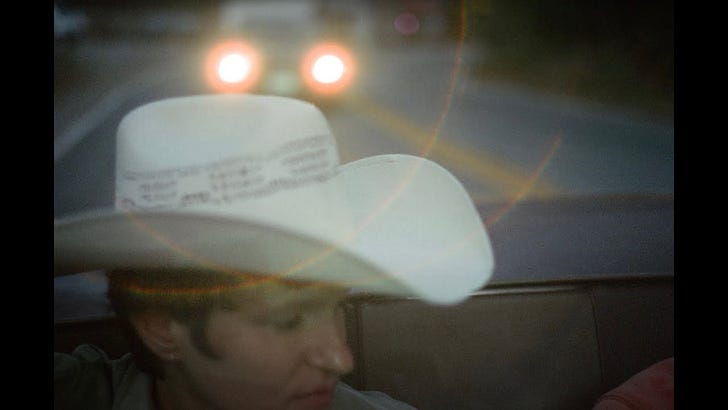Proof That She Lived
Adrienne Lenker: 'Sadness as a Gift' + Grief + Luck + Feeling the way forward
It’s a gorgeous late-summer Saturday in 2021 and my toddler daughter is a guest at a birthday party for the first time in her young life. I recall the details near-photographically: the colorful gifts piled high on the retaining wall of a shared courtyard, the blue layer cake decorated with cartoonish sharks, the inflatable basketball hoop wobbling on the grass. Here I am, making small talk with strangers, flexing social muscles that have gone mostly unexercised during the isolation of the pandemic, when my phone buzzes in my pocket. I glance at the screen: my mother is FaceTiming me. For a moment, I contemplate answering, but then I tap the side button that stops the ringing.
By the time I get home and FaceTime my mother back, she is in bed. It is her first full day at home after a supposedly routine surgery. As she answers, she is lying in the dark in her bedroom in rural Connecticut. My daughter and I can hardly see her. She tells me she’s tired and will call me tomorrow. I’m sure that we say “I love you” before hanging up. Later, I will screenshot the record of that call—our last ever conversation. It lasted 25 seconds.
My phone rings again around 5:30 the next morning. As I answer I register that it’s unusual for my brother—temporarily staying with our parents during a cross-country move—to call so early. He tells me our mother has collapsed. She’s not responding. I can’t understand the words he is saying. She’s not responding, he repeats.
No one can say the right thing. My grief therapist encourages me to look for signs of my mother’s spirit guiding me: in a cardinal I might see, in a car accident I might narrowly avoid. I can’t bring myself to tell her I don’t believe in that sort of thing, so I simply stop going to therapy. The day after my mother’s funeral, I learn that I am pregnant again and respond to this wanted news with a disorienting mix of gratitude and sorrow. How can I be a mother when I no longer have a mother?
Many people instruct me to try to talk to her. I imagine her in the room with me, but my mind goes blank and I stammer dumbly through tears, “Mom, I miss you so much,” unable to express the depth of my anguish in words. While other people I know seem to be able to navigate through grief, I feel like I am drowning in it, unable to keep my head above water.
“Sadness as a Gift” found me two and a half years after my mother’s death, still struggling to make sense of reality, consciousness stretched painfully between the past and the pressing concerns of the present.
You and I both know
There is nothing more to say
Chance and has shut her shining eyes
And turned her face away
I started listening to the song all the time. I listened to it on repeat on the train, red eyes hidden behind sunglasses as I headed towards the art museum where I work. I sang it again and again to my second daughter, then 20 months old, trying to cajole her to sleep. Alone in the car, I played it and sang along—Seasons go so fast / thinking that this one was gonna last—and imagined my mom sitting next to me in the passenger seat, cracking jokes and talking about the future.
It was partially the lyrics that got me—the way they reframe grief after loss as a form of good fortune. We can see the sadness as a gift. How lucky I was to have such a mother, who shared her thoughts and worries with me, who cared about the minutiae of my days, who saw all my flaws and loved me anyway. But it was just as much the feel of the song, which Adrienne Lenker and her band recorded live in a tiny studio in the woods, with the musicians just existing in space together, unencumbered by headphones, feeling their way forward without listening back to old takes or aiming for precision. Lenker’s lilting vocals float above a violin’s mournful melody while an acoustic guitar keeps the rhythm. It sounds perfect, without ever insisting that things are perfect. We can see the sadness as a gift and still…
The song reflected my grief back to me—and helped me learn how to relate to it: one moment at a time, not worrying too much about how anyone else would do it. Spring came around again, inevitably, with the same signifiers as ever before: the explosion of magnolias, the fragrant lilacs, the peony blossoms so large and heavy that they fell over on their thin stems. The world looked just like it did when she was here, but somehow, she was not.
The days, as they accumulate, start to feel more bearable. There are children to be raised. There’s work to be done, joy to be felt. When I turn on “Sadness as a Gift,” it still brings tears to my eyes, and I wouldn’t have it any other way. They’re proof that my mom lived and mattered. The pain feels bad, but I’m glad to have it. ✹



